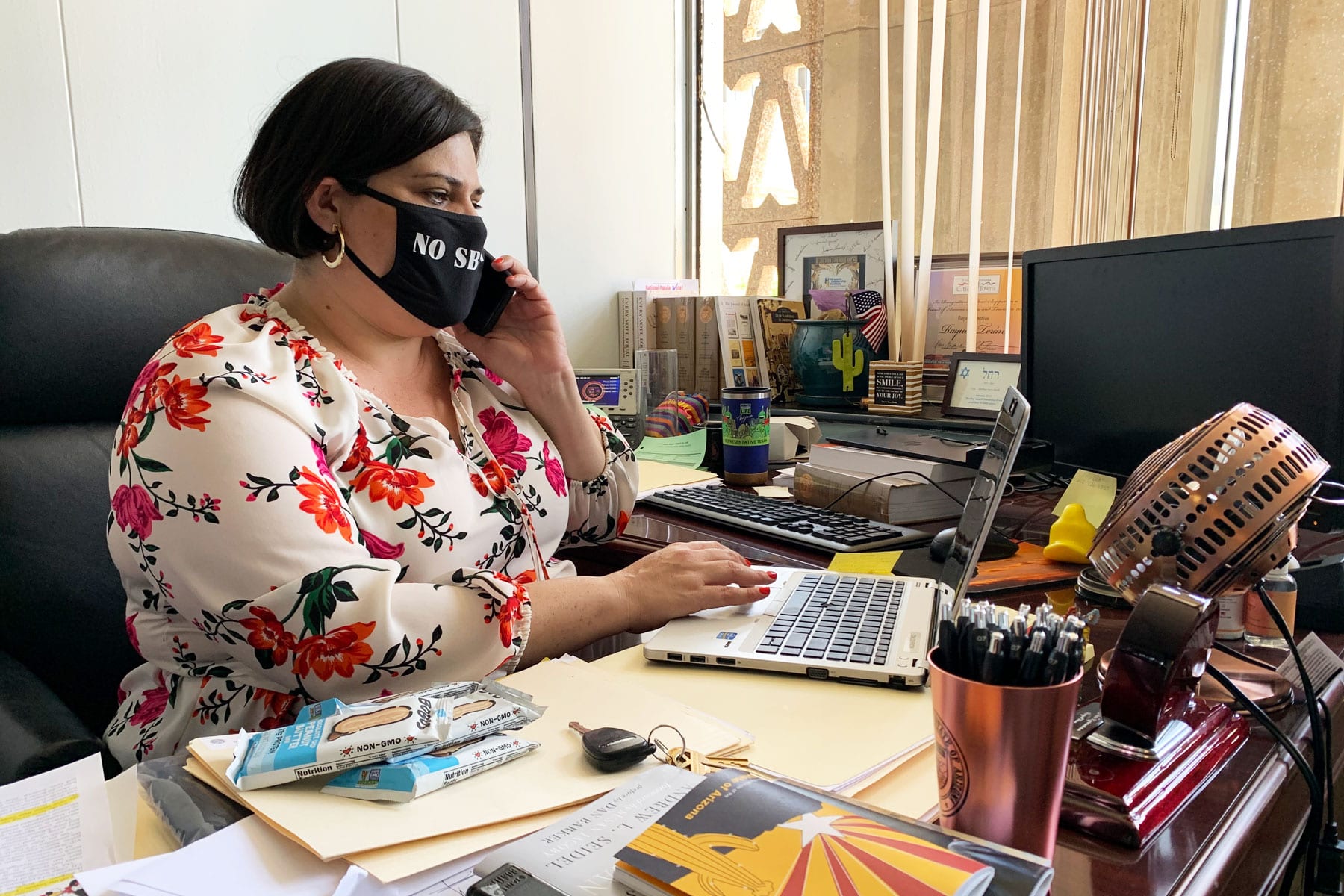PHOENIX — As Arizona’s Republican-controlled state legislature weighs a series of bills that would impose new restrictions on when and how voters can cast ballots, voting rights advocates are hoping that backlash to a similar law passed in Georgia will help derail the proposals in the Western state.
Arizona is at the forefront of a nationwide Republican push to place new restrictions on voting in the form of additional identification requirements, shortened early voting windows and limits on how voters can return ballots. New measures could result in the most significant contraction of voting access in decades.
The effort follows Democratic victories in newly minted political battlegrounds, most prominently Arizona and Georgia, that put President Joe Biden in the White House and flipped party control of the U.S. Senate. It also comes as former President Donald Trump continues to erroneously insist that massive voter fraud cost him the election, fueling concerns about voting irregularities among the Republican base.
Critics of the proposed restrictions, including Biden, say the bills are designed not to address election fraud but to suppress votes from Democratic-leaning constituencies such as communities of color. In his first presidential news conference, Biden likened the Republican proposals to a new version of the “Jim Crow” laws that existed before the Civil Rights Movement that blocked Black voters.
In a move that could come to define Biden’s presidency, Washington Democrats are trying to pass a sweeping voting rights bill, known as H.R.1 or the For the People Act, that would preempt some of the state proposals. But their party is largely on defense on the state level, including in Arizona, one of the 30 states where Republicans control both legislative chambers. It is also one of 23 states where Republicans not only control the legislature but hold the governor’s mansion, meaning any voting bill that passes is likely to be signed into law.
Arizona state Rep. Raquel Terán, a Democrat, said in an interview that the sheer number of voting bills Republicans have introduced this session “feels extreme.” She attributes it in part to their party’s loss of a second U.S. Senate seat last year and the state backing a Democratic presidential candidate for the first time since 1996. Republican margins of power in both the state House and Senate also dwindled to just one seat, meaning if Republicans lose the support of a single lawmaker in either chamber it can stymie a bill’s chances.
“Either they want to show what their values are, to try to get votes, or they know this is the last session that they have because they’re on the verge of losing this power,” Terán said.
“I think after the bill that was passed in Georgia, Arizona has been on everybody’s radar,” she added.
As of late March, 361 bills with restrictive provisions had been introduced in 47 statehouses, according to the Brennan Center for Justice, marking a 43 percent increase in just over a month. Texas now leads the country in sheer number, with 49 bills pending, followed by Georgia, which has 25, including the proposal that has already been signed into law. Arizona is on its heels with 23 bills, including a handful that could still receive a vote before the legislative session ends.
Brennan Center’s Eliza Sweren-Becker said the unprecedented number of proposals to restrict voting this year is both a “backlash to historic turnout” in the 2020 election and a “reaction to the ‘browning’ of America.” “It’s not a coincidence that Georgia, Arizona and Texas are generally more racially diverse already than most of the rest of the states across the country, and they are becoming less White more quickly than most of the rest of the country,” she said.
Arizona was one of the earliest states to expand early voting via the use of mail-in ballots. In the 1990s, when Republicans typically controlled the state legislature and the governor’s mansion, Arizona shifted from “absentee” voting to early voting and laws were changed so that voters did not need to have a reason to request ballots ahead of an election instead of voting in person. In 2007, the Republican-controlled legislature approved the Permanent Early Voting Act (PEVL), a popular program that allows voters to remain permanently on a list to automatically receive mail-in ballots. In the 2012 presidential election, about 61 percent of Arizona voters cast early ballots; by the 2018 midterm elections, nearly 80 percent did, according to elections data.
As the state’s demographics shifted, with Latinx voters making up an increasing share of the electorate, Democrats began treating Arizona as a presidential swing state. In 2020, for the first time in the state’s history, the rate at which Democrats opted to cast early ballots was comparable to the rate at which Republicans did.
Now, in the halls of Arizona’s statehouse, it is only the offices of Democratic lawmakers that display the “I love PEVL” signs distributed by Progress Arizona. It was one of more than 30 organizations that sent a letter last week to Allstate Insurance, CVS pharmacies, Enterprise Rent-A-Car and Farmers’ Insurance — the top donors to sponsors of the restrictive voting bills, along with others that would criminalize some forms of protest and lessen police accountability, according to critics — saying the Republican proposals do not square with public statements the companies have made supporting democracy and racial justice. As of mid week, none had publicly responded.
It’s part of an effort spanning several states to pressure corporations that embraced racial justice slogans during last summer’s protests to reject restrictive voting bills that could disproportionately hurt minority voters.
Delta Airlines and Coca-Cola, which are headquartered in Georgia, have struggled with how to handle public outcry over the voting law there, which gives voters less time to request absentee ballots and imposes new identification requirements, among other provisions. Major League Baseball moved its All-Star game from Atlanta to Colorado in protest. Progress Arizona executive director Emily Kirkland said it made clear that corporations are “important to the fight” to stop similar laws in places like Arizona, adding: “The world is watching.”
Republicans have decried critical reactions to the voting bills as yet another sign of so-called “cancel culture” and urged businesses not to get involved. Georgia Republican Gov. Brian Kemp warned corporate leaders not to “bow down” because it will “never be enough.” Republican Senate Majority Leader Mitch McConnell told corporate executives this week to “stay out of politics” before clarifying that “they’re certainly entitled to be involved” but should “read the damn bill.”
Arizona’s legislature on Wednesday approved two election-related bills: One was a messaging bill rejecting H.R. 1, and the other will prohibit the use of private money to administer elections or register voters. Neither is significant enough to be included in the Brennan Center’s tally of proposed restrictive laws, but a handful of substantive proposals are still in the mix as lawmakers debate a state budget ahead of the legislative session’s end.
SB 1485 would make PEVL impermanent if a voter did not vote at least once every four years; SB 1713 would change identification requirements for individuals who vote by mail; and SB 1106, which has become a sort of catch-all vehicle, has a provision that would make it a felony for out-of-state voters who do not meet residency requirements to vote in a presidential election in Arizona. SB 1593, which would require mail-in ballots to be postmarked by the Thursday before an election, is technically still in play but its critics believe it likely does not have the Republican support to pass. Given one Republican “no” vote can sink a bill, voting-rights groups plan to keep the pressure on key lawmakers with phone campaigns.
“Any given day they can bring those bills up — most of them are one step, or two steps away, from ending up on the governor’s desk,” said Alex Gulotta, the Arizona state director for All Voting is Local, a group that advocates for voting access.
Doug Ducey, Arizona’s Republican governor, has said he does not comment on pending legislation but is “interested” in the slate of proposals.
Though dozens of other bills, including some of the most extreme, appear to be dead — one would have given lawmakers final review of election results; another would have required notarization of mail-in ballots — voting-rights advocates note the Arizona legislature has entered “striker season.” As Arizona lawmakers attempt to wrap up their work, they sometimes file strike-everything amendments that entirely replace a bill’s language. These striker bills mean at any point a rejected voting proposal could resurface and see a swift vote.
Arizona state Rep. John Kavanagh, a Republican who chairs the House elections committee, said his panel did not debate some bills considered too controversial. He questioned why a group of Arizona business leaders last week said the remaining proposals were an attempt to disenfranchise voters instead of saying the group “applauds Republicans for killing controversial election bills.”
The push by Arizona Republicans to enact new laws to restrict voting predates the national effort inspired by the results of the 2020 election, though it has picked up steam since. Democratic state Rep. Athena Salman notes there was an uptick in proposed restrictions nearly immediately after the Supreme Court’s 2013 decision in Shelby County v. Holder, which invalidated the “preclearance” section of the 1965 Voting Rights Act.
Before the decision, Arizona was among the states and localities with a history of race-based voter suppression that were required to clear changes to voting laws with the Justice Department before they could take effect. After the decision, dozens of voting laws were introduced in states previously covered by what was seen as the heart of the Civil Rights-era statute.
“Now, since Shelby County, we don’t have any preclearance,” Salman said, listing voting laws that Arizona Republicans have proposed or passed in the years since, including one that is currently before the Supreme Court.
“This year, it’s open season,” she added.
Last month, conservative justices, who have a majority on the high court, indicated during oral arguments that they were receptive to upholding a 2016 Arizona law that limited who could return ballots on behalf of another voter and invalidated ballots cast in the wrong precinct. A lower court had deemed the law racially discriminatory. When the lawyer representing the Arizona Republican Party was asked why such ballots cast in the wrong precinct should not be counted, he said it could put them at a “competitive disadvantage.” Voting rights advocates worry that the Supreme Court’s ruling in the case has the potential to further erode the Voting Rights Act’s protections.
Opponents of the Arizona voting bills say some will likely have a disproportionate impact on specific voting groups, such as those living in remote areas of the Navajo Nation, where many members’ first language is not English but Diné. The bill that would require voters returning mail-in ballots to include their driver’s license or voter number as a form of additional identification adds a hurdle for voters without driver’s licenses, who tend to be lower-income individuals or racial minorities.
Kavanagh rejected arguments that those still under consideration were designed in any way to be discriminatory. “To suggest that the measures we’re talking about disproportionately burden minorities is frankly insulting to minorities, it’s like saying they’re not capable of responding to a letter … or they don’t vote as frequently as non-minorities,” he said in an interview.
“Our motivation is to stop election fraud,” he said.
Critics of the voting bills say they are largely in the dark about if and when specific proposals will come up for a final vote. Arizona’s legislative session technically ends on April 24 but will continue until lawmakers approve a state budget.
“We’re at a time of uncertainty — mile 16 in the marathon, or maybe 18, we still have awhile to go — where on any given day something could come forward and it could pass,” Gulotta said.






